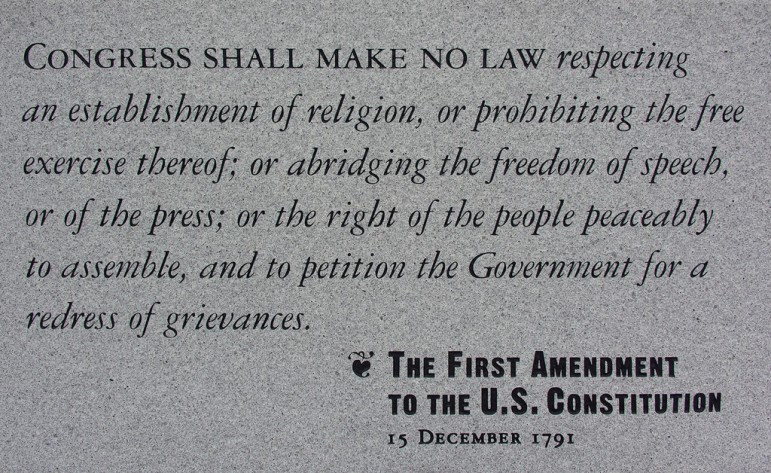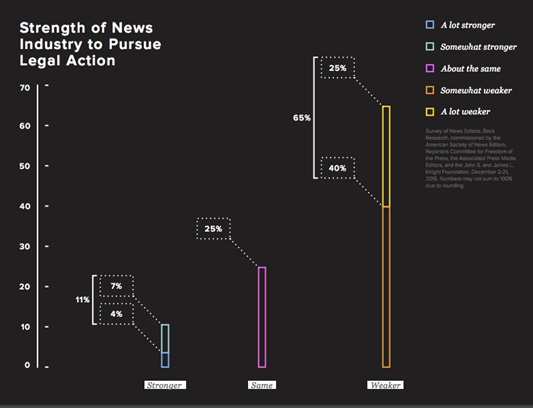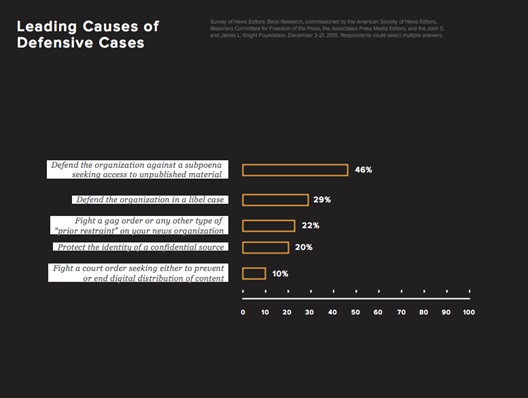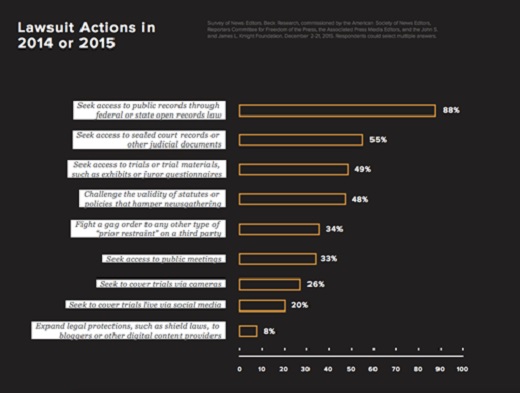
As the face of print journalism shifts from foundering newspapers to increasingly less profitable digital, the question arises of how the First Amendment, which includes the freedoms of the press and speech, has fared. A new survey published by the Knight Foundation, “In Defense of the First Amendment,” explores whether news organizations are taking the same, fewer, or further steps to protect their First Amendment rights, compared to ten years ago. According to the survey, news organizations on the whole feel less able to pursue issues in court when their First Amendment rights are challenged, which leads to all sorts of inquiries as to how these changes are affecting society and their impact on journalism.
“This informal survey suggests that serious problems are looming for upholding the free speech and press rights enshrined in the First Amendment. Leading editors from daily newspapers say the industry is becoming less able to fulfill its historic role as First Amendment champions,” said the survey in its conclusion.
The American Society of News Editors, Reporters Committee for Freedom of the Press, Associated Press Media Editors, and the John S. and James L. Knight Foundation jointly conducted the project through an online survey last December of 66 top editors from small and larger publications, including online-only publications. The poll was not meant to be scientific, but rather illustrate the variety of opinions editors have on the issue. Indeed, as demonstrated by the survey’s results, the poll actually over-represents large organizations, as they are statistically more likely to pursue First Amendment cases and can afford to do so.
Sixty-five percent of those editors who responded to the survey (66 respondents out of 286 contacted) said the field of print journalism as a whole has weakened in its ability to pursue First Amendment issues legally. In terms of their own organizations, 44 percent of respondents felt they were less able to pursue First Amendment cases in court.

Of those editors that said the industry was less able, 89 percent said the main reason why was money. Twenty-seven percent said they had personally experienced cases within their own organizations where the cost of litigation prevented them from pursuing a case they otherwise would. Freedom Of Information Act request fees are a particularly concerning barrier, for example.
One editor said, “We routinely run up against Freedom of Information Law denials that we would challenge in court if we had unlimited resources. I don’t know of any news organizations that doesn’t [sic] feel somewhat constrained by the cost of litigation.”
Another editor stated, “Government agencies are well aware that we do not have the money to fight. More and more, their first response to our records request is, ‘Sue if you want to get the records.’”
Sixty-one percent of the respondents maintained that their organization had not experienced a situation where they didn’t pursue a case due to budget constraints. (Again, it’s important to remember larger organizations are disproportionately represented in this survey. Budget constraints likely affect smaller organizations, which may also be conducting more local reporting.) Arguably, local publications’ failed attempts to retrieve public records and conduct thorough investigations are particularly troubling. If publications report without the necessary information and potentially limit the scope and depth of their coverage, there is a real concern for whether their journalism is truly benefiting the public.
Sign up for our free newsletters
Subscribe to NPQ's newsletters to have our top stories delivered directly to your inbox.
By signing up, you agree to our privacy policy and terms of use, and to receive messages from NPQ and our partners.
On the subject of digital media, the overwhelming percentage of respondents, 88 percent, agreed with the statement, “In the digital age, there are many unsettled legal questions about the scope of free expression.” A consequence of the changing face of media is that legal challenges to the First Amendment may more likely be settled than taken up in court and debated to reform the laws. Rather than change the current landscape of outdated case law on the First Amendment concerning digital media, not fighting cases in court will only further perpetuate the legal conundrum, negatively impacting the industry as a whole.
In situations where publications have had to go on the “defensive,” defending themselves from challenges like requests to reveal a confidential source or lawsuits alleging libel, 71 percent felt that they had the same ability as ten years ago to fight those cases. However, when it comes to “offensive” cases, in which a news organization actively pursues litigation, such as fighting for a FOIA request or access to courtroom proceedings, 44 percent of editors felt they were less able to do so.
When organizations did pursue “offensive” cases, 88 percent sought access to public records. Some editors believe there were fewer “offensive” cases because of the decline in “watchdog journalism” or investigative reporting that would call for FOIAs or other suits for public record access. One editor said:
With fewer people, the industry is in general doing less investigative work, which is often the type of reporting that results in legal fights over records and access. Plus, so many newsrooms do not cover government to the extent they used to. Instead, they are focusing on “passion” or “franchise” topics and they often are not topics that require record-based reporting.


Among the other observations in the survey, one editor noted that the differences from prior years are in part due to the changing missions of the organizations. Previously, more organizations would have pursued legal activity, perhaps in principle or because the organization felt it had a stake in doing so. “In the 1980s, our news organization vigorously contested all First Amendment cases—often regardless of costs. In this era, our in-house lawyer is acutely aware of the cost of litigation and other issues that require hiring outside counsel.” With limited ability to pursue public record access and less investment in investigative journalism, the changes over the last ten years would appear to be detrimental to the public.
However, the study also noted that while there is a difference in whether news organizations are taking on “offensive” cases, editors are still trying. “At the same time, though, these news leaders—many from larger news organization that are still taking on cases—have not given up.”
Not only do publications have to try harder, they have to make it a priority to fight for the First Amendment when they are financially able to do so. Reputable and pioneering journalism that can enact social good depends on a solid foundation of and the protections afforded by the First Amendment. As the laws have not caught up with the times, publications must challenge those statutes and fight for their right to access information to help protect themselves and the rest of the industry.













